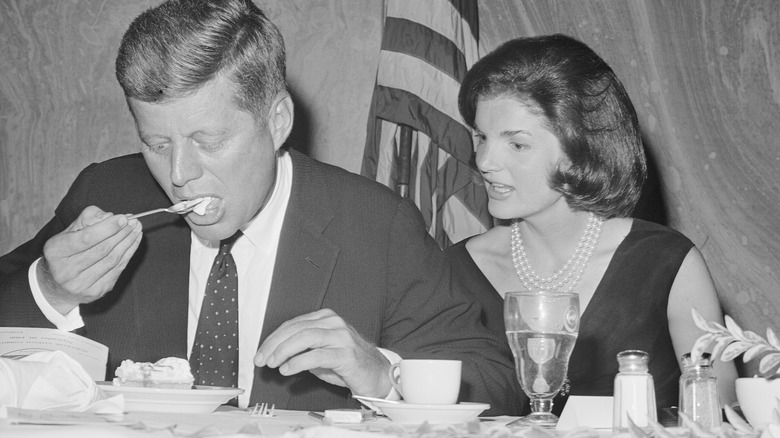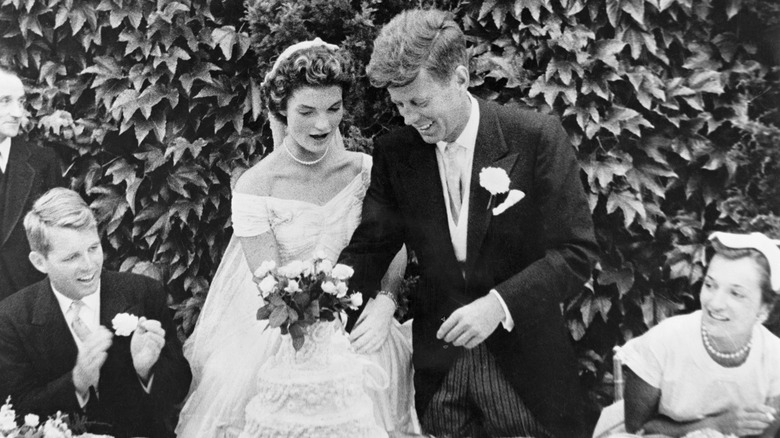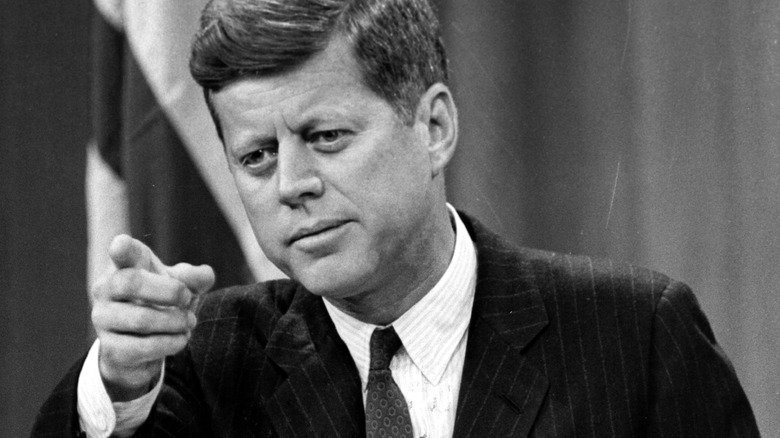John F. Kennedy's Favorite Foods (And Why He Had To Be Reminded To Eat Dinner)
His impact on American political life is self-evident, but John F. Kennedy has been given credit for shaping the country's zeitgeist in other spheres too. For example, he's long been held responsible for killing the hat as an everyday item of men's fashion (though Snopes says otherwise). In his memoir "My Life as a Mankiewicz," screenwriter Tom Mankiewicz credited the initial success of the James Bond novels to Kennedy naming then among his favorite books. And according to the Washingtonian, he helped reshape the menus in Washington D.C. — which had a reputation as a "culinary backwater" before he came along — by making a show of hiring a French chef.
Ironically, according to the John F. Kennedy Presidential Library and Museum, Kennedy wasn't much of what we'd now call a foodie. In his youth, he was put on restricted diets several times to combat his myriad health woes (per The Atlantic). After his experiences in World War II, he had trouble with digestion and was a light eater. In fact, in the White House, he often needed a reminder that dinner was ready. Still, Kennedy had his favorite dishes like the rest of us. And for anyone who's ever attempted or enjoyed an imitation of the president's thick Boston accent, his favorite lunch will seem particularly appropriate: New England clam chowder. The JFK Library names this as his preferred soup, and soup his preferred midday meal — usually paired with a sandwich and some fruit.
John and Jackie Kennedy gave their favorite waffle recipe to various cookbooks
Aside from clam chowder for lunch, the John F. Kennedy Presidential Library and Museum doesn't name the former president's favorite dishes. Instead, it gives a sample of foods President Kennedy was known to enjoy. For breakfast, he might have poached eggs, crisp bacon, or orange juice; for dinner, lamb chops, baked beans, corn muffins, and white meat turkey were popular choices.
But the library has also archived many requests that John and Jackie Kennedy received over the years from those interested in their favorite recipes. One woman, Ruth Blackford, asked for recipes for a "Democratic Cookbook" she was assembling. Another woman, Martha MacBride, wanted to know the president's favorite casserole. He had to disappoint her on that score — Kennedy wrote back that he didn't have a favorite casserole recipe. But he and Jackie both responded to several of these letters by including a recipe for waffles.
The recipe, which has appeared in several versions across many cookbooks, was one Jackie Kennedy liked to make for her family. Per Irish Central, they're made with cake flour and either milk or buttermilk. To that, add 2 eggs, a pinch of salt, and a ½-cup of butter, with more butter to follow after cooking in a waffle iron.
Food shortages were one of Kennedy's earliest concerns as president
John F. Kennedy may not have been much of an eater, but as a wealthy scion of the New England upper crust, he never had to worry about his meals. Per the Washingtonian, he was raised on French cuisine while his father served as ambassador to Britain, and noted chefs catered to him on the campaign trail before he even won the White House.
But during his campaign, Kennedy did recognize food shortages as a significant issue. According to the World Food Program USA, he argued in 1960 that hunger was a major obstacle on the road to peace and lamented the scarcities found seemingly everywhere except the United States. As president, he led the way in founding the United Nations World Food Program, increased U.S. food aid to the Congo, and expanded on the Agricultural Trade Development and Assistance Act to strengthen America's food exports overall. After the expansion, it became known as the Food for Peace Act, after one of Kennedy's campaign speeches.
Kennedy continued to speak on the subject of food shortages as president. Only five months before he died, he spoke at the World Food Congress and declared that hunger could be eliminated from the Earth. "We have the ability, we have the means, and we have the capacity ... [w]e only need the will."


